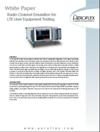Require Registration
RFMD Microwave MMICs Brochure
July 24, 2012
2012-2013 RFMD Product Selection Guide
July 24, 2012
RF and Microwave Coaxial Connectors and Cable Assemblies
July 18, 2012
Harmonic Mixer Primer: The Gateway to the Millimeter Wave Frontier is Harmonic Mixer Technology
July 17, 2012
Noise Figure Measurements
July 9, 2012
Low Noise Amplifier Testing Challenges
July 9, 2012




